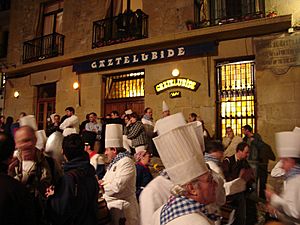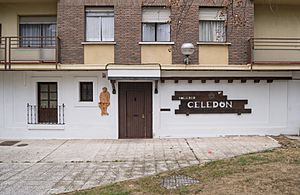Txoko facts for kids
A Txoko (pronounced "CHO-ko") is a special kind of cooking and social club, mostly found in the Basque region of Spain. It's a place where people, usually men, come together to cook, try out new recipes, eat delicious food, and just hang out. There are believed to be over 1,000 of these clubs. For example, in the Spanish town of Gernika, which has about 15,000 people, there are nine Txokos with around 700 members! You can find Txokos not just in Spain, but in many cities around the world where Basque people live.
Contents
What Does 'Txoko' Mean?
The word Txoko comes from the Basque language. It's a smaller version of the word zoko, and it means "nook" or "cozy corner." In some areas, people might say xoko instead. In Spanish, these clubs are called sociedades gastronómicas, which means "gastronomic societies" or "food societies." In French, they are called sociétés gastronomiques.
A Look Back: History of Txokos
No one is completely sure how Txokos first started. Some think they might have begun in Bilbao, Spain, possibly inspired by social clubs in Britain. However, they are most famous in San Sebastián. The very first Txoko there was formed in 1870. It was just an informal group of friends who met regularly to eat, drink, sing, and chat.
Txokos became even more popular during the time of General Franco in Spain. During his rule, talking about politics was not allowed in Txokos. This made them one of the few places where people could freely speak Basque and sing Basque songs without getting into trouble with the government. Most Txokos are in Spain, but they have also been created in many other places around the world.
How Txokos Work
Usually, a Txoko is started by a group of friends. They buy or rent a suitable place together. Then, they create a set of rules, like a constitution, that covers how members join, how the club is run, and other important things.
These rules often say that political discussions are not allowed inside the Txoko. They also usually have rules about women joining. Most Txokos allow women to come in to eat, drink, and socialize. However, they are typically not allowed to cook in the main kitchen. Modern Txokos often use fresh ingredients and cook everything from scratch. This is a lot like the "slow food" movement, which focuses on enjoying food that is prepared carefully and traditionally.
A typical Txoko might have up to 80 members, but it usually doesn't have space for everyone at once. So, individual members or small groups often get together to buy ingredients and cook for themselves, their families, or their guests. A few times a year, all the Txoko members are invited to gather for a bigger event.
Why Txokos Are Important
Txokos are seen as a way for people to escape the everyday stresses of life. They are a great example of people coming together to share good times. They also play a big role in keeping Basque culture and identity strong. They helped people move from living in the countryside to living in cities while still holding onto their traditions.
Txokos bring together people from all different social backgrounds. They are so important in San Sebastián that the mayor of the city is expected to have a meal at each of the 75 Txokos every year! Some people also point out that Txokos are very traditional. This includes the rules about women and their focus on keeping old Basque dishes alive.
See also
 In Spanish: Txoko para niños
In Spanish: Txoko para niños
 | Precious Adams |
 | Lauren Anderson |
 | Janet Collins |



